Blaxploitation Education: Foxy Brown
If you can stomach some sexual violence, Blaxploitation action doesn't get much better than this.
Foxy Brown
Written and directed by Jack Hill
1974
Is Pam Grier the #1 Blaxploitation star? I’m certainly biased in my assessment, but the more of her movies I see, the more I’m thinking that she comes out ahead of everyone else. You could make a case for Jim Brown or Fred Williamson (but probably not Richard Roundtree, since he really had only one unreservedly good film), but as good as they are, Grier gets to display a wider spectrum of emotion, demonstrating vulnerability but also maintaining a fierce, steely attitude. She gets to prevail against villains who are too quick to discount her abilities, and she always looks absolutely stunning while doing it.
Foxy Brown is the movie that really cemented Pam Grier in the stratosphere of Blaxploitation heroes, and it’s probably her best-known film too, inspiring the name of a rapper, a character in the Austin Powers films, and countless others. It was originally meant to be a sequel to Coffy, but the producers changed their mind at the last minute, necessitating a rewrite that probably accounts for some of the slapdash plotting. But that’s nowhere near a dealbreaker, since nobody should let logical inconsistencies get in the way of enjoying a badass heroine taking on racist drug dealers.
After an opening credits sequence set to a bouncy theme song by Willie Hutch that features the main character and some silhouette copies dancing around in various outfits (and also showing off some martial arts moves, demonstrating the continuing confluence of Blaxploitation and kung fu movies), the movie kicks off by following a shifty-looking Black guy who is trying to elude some white pursuers. This turns out to be Foxy Brown’s brother Link, and he’s played by Antonio Fargas, who makes the character one of his trademark lowlife scumbag doofuses (see Across 110th Street for another example). He manages to phone his sister to help him escape the situation, and she does by showing up in her car and letting him jump through the sunroof while they try to elude the thugs.
After getting Link back to safety, Foxy interrogates him about what’s going on, and he claims that he borrowed some money from a loan shark in order to run a numbers game, but he lost all the money when a bunch of people’s number came up at the same time on Martin Luther King Day. He complains that he’s having financial troubles, especially since Foxy won’t let him deal drugs anymore. He gets a nice speech about his limited options, saying, “Foxy, look, I'm a Black man. I don't know how to sing, I don't know how to dance, or how to preach to no congregation. I'm too small to be a football hero, and I'm too ugly to be elected mayor. But I watch TV and I see all them people in all them fine homes they live in and all them nice cars they drive, and I get all full of ambition! Now, you tell me what I'm supposed to do with all this ambition I got?”
It’s a striking acknowledgment of the difficulties that so many Black people faced at the time (and still do, in many cases), having been promised the “American dream” but finding it outside of their grasp unless they’re among the lucky few who are palatable to white society. As white people spent the 20th century building generational wealth through the ability to attend college, earn pensions, and purchase real estate, Black people were denied these opportunities, and even when they managed to succeed, they often had everything taken away from them through racist violence. It’s no wonder that so many people like Link felt that operating outside the bounds of the law was their only option, despite the damage they were doing to themselves and their communities.
While Link claims that he’s trying to operate a “legitimate business,” or at least one that’s not as actively harmful as selling drugs, we learn that he actually had been dealing, and the guys after him were higher-ups in the organization who were mad because he lost a kilo of cocaine when the cops found it. Despite his protestations, he really is the lowlife scum that Foxy doesn’t want to believe he is. And unfortunately, while she allows him to hide out at her place for a while, she inadvertently provides him with a way to solve his problems. You see, she’s dating a guy who had been working as an undercover drug enforcement officer, and he has just gotten plastic surgery to change his face so he can go into hiding. She visits “Michael,” as he’s now known (Terry Carter, who would later star in the original Battlestar Galactica series) in the hospital for a little hanky panky before he gets the bandages off, and later, when he comes home with her, Link gets suspicious about how Foxy has seemed to move on so soon after her previous boyfriend’s disappearance. Soon enough, he puts two and two together and realizes that he can tell the drug dealers about the true identity of the guy they want dead.
When they send somebody to assassinate Michael, Foxy is heartbroken, but she also wants revenge. When she tracks down Link, she provides this movie’s first example of the righteous fury that Pam Grier can do so well, threatening to blow his head off (and coming really close to actually doing, firing a bullet into the wall next to his ear) if he doesn’t give her some information about the drug dealers who he sold her lover out to. It’s an arresting scene, with Foxy on the brink of unleashing her anger on someone she cares about and eventually taking her fury out on everything around her, smashing up all the furniture in Link’s apartment and telling him to get out of town if he knows what’s good for him.
So with that, Foxy is on a mission of vengeance. The drug kingpin in the city is a woman named Katherine Wall who also operates a ring of high-class call girls that she uses to bribe judges and other officials and make sure her operatives can avoid criminal convictions. She’s played by Kathryn Loder, who previously appeared as a Pam Grier antagonist in The Big Doll House (also directed by Jack Hill), where she was a sadistic women’s prison guard with suppressed lesbian tendencies. Here, she gives her character a combination of haughty authority and a desperate weakness for her second-in-command, Steve (Peter Brown, a cast member on the soap opera Days of Our Lives for most of the 1970s), a handsome younger man who fulfills her sexual desires as a way to gain access to money and power but registers his distaste for her whenever she’s not looking.
Foxy’s scheme involves getting hired as one of Katherine’s call girls and then messing up her operations from the inside. Her first assignment is to accompany another woman, Claudine (Juanita Brown, who also appeared in Willie Dynamite), to a party where they’re supposed to please a judge and convince him to go easy on a couple of drug dealers who are on trial the next day. While Brown isn’t nearly as good an actor as Grier, her character provides an emotional element to these proceedings when her husband and son come to visit her and get sent away by Katherine’s thugs. Claudine is a woman who is trapped in a situation where she has to follow Katherine’s demands or face the consequences, and the only thing she can do is turn to drugs to try to numb the pain she’s constantly feeling.
That explains why Claudine agrees to go along with Foxy’s plan, which involves making the judge think that he’s going to have a threesome with the two of them, then stripping off his pants, making fun of his small penis, and then throwing him out into a hallway in front of a bunch of women who call him a pervert and hit him with umbrellas. The next day, we learn that he was not too happy about this treatment, so he threw the book at Katherine’s dealers. And it’s not too long before Katherine and her men figure out that Foxy was the mastermind behind this scheme, so they’re out for blood because she messed up their business.
This leads to the portion of the plot in which Foxy has to be broken down and humiliated before she can overcome long odds and return from apparent death to wreak vengeance on her enemies. But before we get there, she gets to have a fun fight scene in a lesbian bar where Claudine had foolishly gone to get a drink. When one woman challenges Foxy, claiming that she has a black belt in karate, Foxy just picks up a barstool and starts beating her with it. A pretty raucous brawl follows, ending with a woman getting her head put through a jukebox.
Unfortunately, the fight delays Foxy and Claudine long enough for Katherine’s men to show up, and while Foxy helps Claudine escape, she can’t avoid getting captured herself. While some of the thugs want to kill her, Steve intervenes and has them bring her back to Katherine, who decides that she’ll be sent to “the farm,” where the men there can have their way with her before eventually selling her into sex slavery in Haiti.
That’s certainly a distasteful turn for the movie to take, and I would definitely have preferred for it not to have its main character raped by some hillbillies. While dramatic structure may require a hero to be brought low before they can overcome the odds and prevail, there’s no way a male character would ever be put through a horrifying, humiliating, devastating violation like this. And unfortunately, it all seems like it’s meant to fulfill some kind of fetish, with the men using a whip against her, tying her up, and calling her racial slurs while committing sexual assault. Gross. Yes, she does manage to escape and get her comeuppance, slicing one man across the face with a razor blade and dousing another with gasoline before setting them both on fire (destroying Katherine’s drug processing facility at the same time), but there’s no reason the movie couldn’t have had her do that before it inflicted atrocities upon her.
All of this gives Foxy even more reason to want to take down Katherine, and to do so, she gets some help from other members of the community who had been affected by drugs. Earlier, we had seen that she is friendly with a guy who is part of a “neighborhood committee” that has taken it upon themselves to fight the drug trade, since the cops sure aren’t doing much about it. When they find out about people who are pushing drugs, they beat them up and force them to leave town. When Michael comments that he’s not sure about whether vigilante justice is the best solution, Foxy replies, “Why not? It’s as American as apple pie.”
This committee seems to be a clear stand-in for the Black Panthers and other Black revolutionary groups, but notably, there’s an emphasis on the positive, community-focused efforts that these groups made. While the white authority figures at the time were afraid about the possibility of violence by Black people who armed themselves, these groups were actually devoted to improving the lives of Black people. When the people in charge had given up on enforcing the law in any way that resembled justice, people took it upon themselves to do what was right. It’s rare to see a movie acknowledge that aspect of these groups.
When Foxy comes to the committee to get help in her quest, they’re not so sure if they want to help, since what she’s after seems more like revenge than justice. But she reassures them, saying, “You just take care of the justice, and I’ll handle the revenge myself.” This leads to a final series of scenes that are kind of questionable in their logic, with Foxy hitching a ride with the pilot who is flying a shipment of drugs in from Mexico (Sid Haig!), although it’s unclear whether she had to go all the way to Mexico to do so or whether he just made a stop at a bar where she could show up and seduce him. Anyway, she enacts some very fitting revenge against Katherine, taking away the thing that was most dear to her (you might be able to guess what it is based on how devoted she was to Steve), but leaving her alive to suffer rather than killing her. And then she gets to walk away with some sense of gratification, the camera lingering on the emotions playing across her face as the credits roll.
In some ways, this is more like a remake of Coffy than a sequel, since it follows a similar structure, with Foxy impersonating a prostitute in order to take down a drug ring from the inside, almost getting killed, and then coming back to get her revenge. It still works though, mostly on the strength of Grier’s performance. Foxy isn’t quite as conflicted about what she’s doing as Coffy was, but in addition to demonstrating a palpable sense of rage, she also gets to enjoy herself as she enacts her scheme. Plus, she gets to wear a series of incredible outfits as she moves confidently throughout these settings, enticing any men who look at her and following up their poor criminal efforts with devastating put-downs (in a sign of the times, she usually uses anti-gay slurs, which were probably really upsetting for 70s guys who imagined themselves to be virile ladies men). And of course, she gets to prove her superiority through highly satisfying acts of violence.
Based on this movie and Coffy, as well as the other appearances that Pam Grier has made in this series, I’m happy to say that she was definitely the top Blaxploitation hero, at least as of 1974. She certainly got some help from director Jack Hill, who was sort of an auteur of exploitation. He managed to wring real depth from his movies, making the characters caught up in these crazy plots seem three-dimensional, while also providing plenty of entertaining sex and violence. Unfortunately, this was his last collaboration with Grier. While I expect I’ll enjoy her appearances in more Blaxploitation movies that I watch, it’s doubtful that anything will match the heights she reached here. There’s a reason that Foxy Brown became a household name, and anyone else will have to settle for second place.
Blaxploitation Education index:
UpTight
Cotton Comes to Harlem
Watermelon Man
The Big Doll House
Shaft
Sweet Sweetback’s Baadasssss Song
Super Fly
Buck and the Preacher
Blacula
Cool Breeze
Melinda
Slaughter
Hammer
Trouble Man
Hit Man
Black Gunn
Bone
Top of the Heap
Across 110th Street
The Legend of N***** Charley
Don’t Play Us Cheap
Shaft’s Big Score!
Non-Blaxploitation: Sounder and Lady Sings the Blues
Trick Baby
The Harder They Come
Black Mama, White Mama
Black Caesar
The Mack
Book of Numbers
Charley One-Eye
Ganja & Hess
Savage!
Coffy
Shaft in Africa
Super Fly T.N.T.
Scream Blacula Scream
Cleopatra Jones
Terminal Island
Gordon’s War
Slaughter’s Big Rip-Off!
Detroit 9000
Hit!
The Spook Who Sat by the Door
The Slams
Five on the Black Hand Side
The Black 6
Hell Up in Harlem
I Escaped From Devil’s Island
Blackenstein
The Bad Bunch
That Man Bolt
Willie Dynamite
The Arena
Black Belt Jones
Sugar Hill
Tough Guys

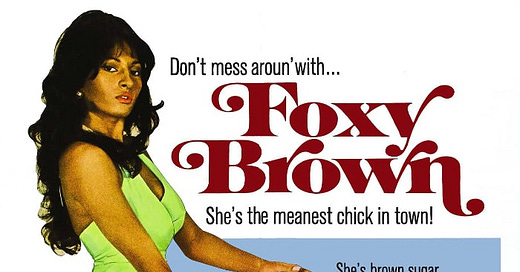



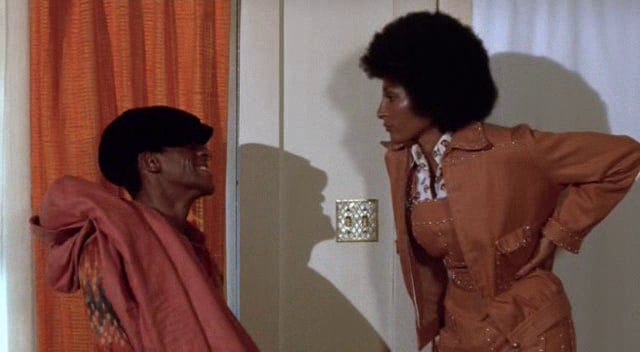
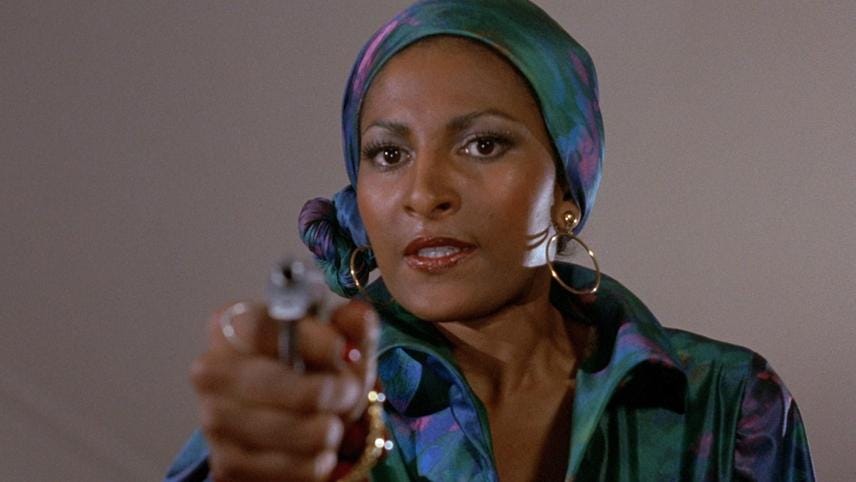
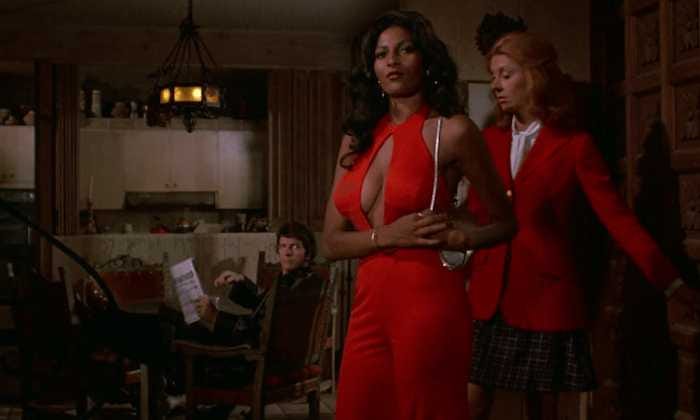
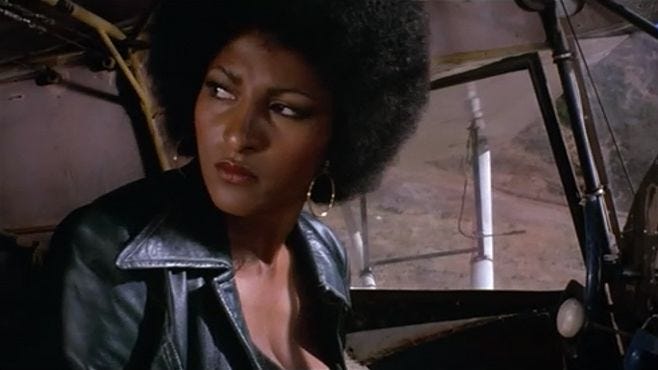
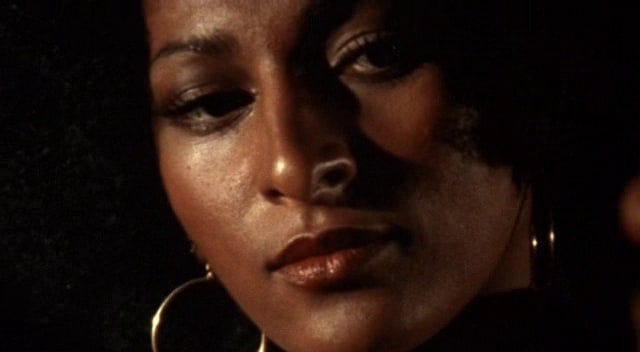
"making fun of his small penis,". Every man's worst nightmare.
I have no argument with your assertion here. If any actor personified Blaxploitation right to the bone, it was Pam Grier.
(RIP Willie Hutch.)